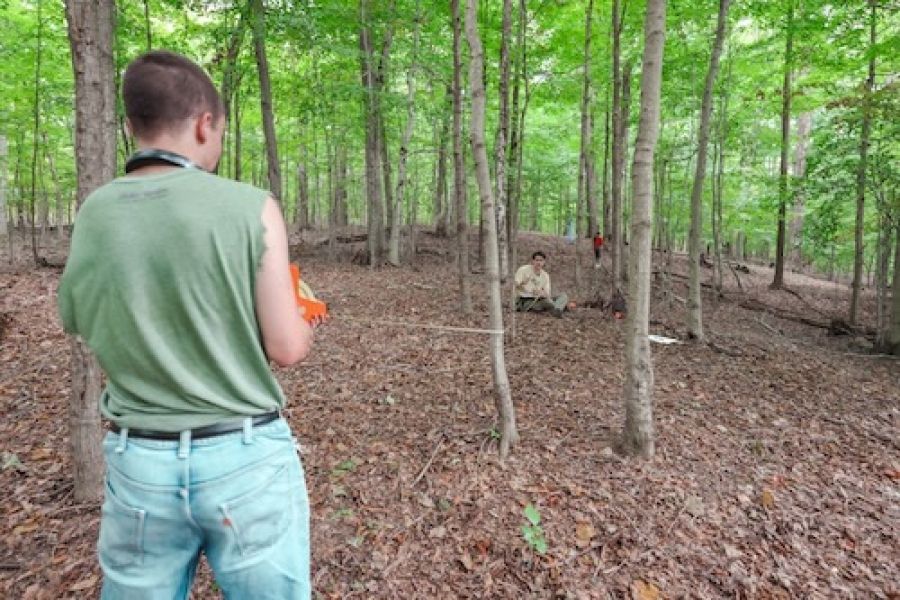Environmental Studies
This program is designed to give you the first two years of a bachelor’s degree.
What You'll Learn
Advance your scientific, advocacy, and leadership skills to protect the planet.
Explore the relationship between people and the planet, studying the science, policy, and ethics of sustainability. Coursework and fieldwork prepare you to understand environmental issues such as conservation, climate change, and resource management. With growing local and global interest in sustainability, you’ll develop analytical, research, and problem-solving skills that support careers or transfer opportunities in environmental science, education, or advocacy.
Where You’ll Go

Environmental Scientists and Specialists
- Communicate scientific or technical information to the public, organizations, or internal audiences through oral briefings, written documents, workshops, conferences, training sessions, or public hearings.
- Monitor effects of pollution or land degradation and recommend means of prevention or control.
- Collect, synthesize, analyze, manage, and report environmental data, such as pollution emission measurements, atmospheric monitoring measurements, meteorological or mineralogical information, or soil or water samples.
- Review and implement environmental technical standards, guidelines, policies, and formal regulations that meet all appropriate requirements.

Sustainability Specialists
- Develop sustainability project goals, objectives, initiatives, or strategies in collaboration with other sustainability professionals.
- Monitor or track sustainability indicators, such as energy usage, natural resource usage, waste generation, and recycling.
- Assess or propose sustainability initiatives, considering factors such as cost effectiveness, technical feasibility, and acceptance.
- Review and revise sustainability proposals or policies.

Environmental Engineers
- Design, or supervise the design of, systems, processes, or equipment for control, management, or remediation of water, air, or soil quality.
- Assess the existing or potential environmental impact of land use projects on air, water, or land.
- Collaborate with environmental scientists, planners, hazardous waste technicians, engineers, experts in law or business, or other specialists to address environmental problems.
- Develop proposed project objectives and targets and report to management on progress in attaining them.
Salary information presented are estimates and can be different for each individual based on education, experience, and the specific employer. Labor market data is based on 2025 estimates derived from Lightcast (Career Coach | Lightcast)
The careers listed above are just a starting point. Our programs mix together important concepts and hands-on skills—but that doesn’t mean your future has to follow the same script. Find out more at Career Exploration & Support.

Program Requirements
To graduate [ 61 credits + 2.0 GPA or higher ]
| Course ID | Course Name | Credits | Minimum Grade |
|---|---|---|---|
| ENGL098 | Accelerated Writing Skills for ENGL 100 | 3 | |
| RDNG116 | College Reading and Study Skills | 3 | |
| BIOL101 | Principles of Biology I | 3 | |
| CHEM101 | Principles of Chemistry I | 4 | |
| MATH020 | Skills & Support for College Algebra | 2 |
| Course ID | Course Name | Credits | Minimum Grade |
|---|---|---|---|
| BIOL104 | General Biology I | 4 | |
| ENGL100 | Academic Writing I | 3 | |
| ENVS101 | Introduction to Environmental Science | 3 | |
| FSS132 | Freshman Seminar- Environmental Studies | 1 | |
| ECON120 | Principles of Microeconomics | 3 | |
| or ECON121 | Principles of Macroeconomics | 3 | |
| or POSC103 | American National Government | 3 | |
| or POSC104 | American State & Local Government | 3 | |
| or ENVS107 | Economy, Society, & the Environment | 3 | |
| or POSC107 | Economy, Society, & the Environment | 3 |
| Course ID | Course Name | Credits | Minimum Grade |
|---|---|---|---|
| BIOL105 | General Biology II | 4 | |
| or BIOL105H | Gen Biology II Honors | 4 | |
| ENGL101 | Academic Writing II | 3 | |
| or ENGL101H | Academic Writing II-Honors | 3 | |
| ENVS102 | Technology and the Environment | 3 | |
| MATH120 | College Algebra | 4 | |
| or MATH138 | Precalculus | 4 | |
| or MATH201 | Calculus I | 4 | |
| or MATH201H | Calculus I Honors | 4 | |
| or | MATH 201 is recommended. Some transfer institutions may not accept MATH120 or 138 for fulfillment of the mathematics requirement for the program. | ||
| SUNY GE #8 US History | US History | 3 | |
| or SUNY GE #9 World History and Global Awareness | World History and Global Awareness | 3 | |
| or SUNY GE #7 The Arts | The Arts | 3 | |
| or SUNY GE #10 World Languages | World Languages | 3 |
| Course ID | Course Name | Credits | Minimum Grade |
|---|---|---|---|
| BIOL211 | Ecology | 4 | |
| CHEM107 | General Chemistry I | 4 | |
| or CHEM107H | General Chemistry I Honors | 4 | |
| ENGL201 | Public Speaking | 3 | |
| or ENGL201H | Public Speaking - Honors | 3 | |
| or ENGL204 | Interpersonal Communication | 3 | |
| or ENGL210 | Intercultural Communication | 3 | |
| SUNY GE #8 US History | US History | 3 | |
| or SUNY GE #9 World History and Global Awareness | World History and Global Awareness | 3 | |
| or SUNY GE #7 The Arts | The Arts | 1 - 3 | |
| or SUNY GE #10 World Languages | World Languages | 3 |
| Course ID | Course Name | Credits | Minimum Grade |
|---|---|---|---|
| CHEM108 | General Chemistry II | 4 | |
| ENGL102 | Approaches to Literature | 3 | |
| or ENGL102H | Approaches to Literature-Honors | 3 | |
| or ENVS105 | Environmental Ethics | 3 | |
| ENVS295 | Global Seminar | 3 | |
| or ENVS295H | Global Seminar-Honor | 3 | |
| MATH200 | Statistics | 3 | |
| or MATH200H | Statistics Honors | 3 | |
| BIOL115 | Field Natural History | 3 | |
| or BIOL116 | Tropical Field Natural History | 4 | |
| or BIOL119 | Botany | 3 | |
| or BIOL205 | General Genetics | 3 | |
| AND BIOL206 | Molecular Genetic Techniques | 1 | |
| or BIOL216 | General Microbiology | 4 | |
| or BIOL216H | General Microbiology-Honors | 4 | |
| or ENVS116 | Soil Science | 3 | |
| or ENVS141 | Agroecology | 3 | |
| or GEOL101 | Introductory Geology | 3 | |
| or PHSC104 | General Physics I | 4 | |
| or PHSC104H | General Physics I Honors | 4 | |
| or PHSC211 | Physics I (Mechanics and Heat) | 4 |
Transfer Agreements

| Transfer School Sort descending | Transfer Program |
|---|---|
Transfer School: Hobart and William Smith Colleges |
Transfer Programl: Multiple Programs |
Transfer School: Syracuse University |
Transfer Programl: College of Professional Studies |


Student & Faculty Stories
On this page
Attend a Discovery Day!
Curious about TC3? Discovery Days give you an inside look at our campus, programs, and an opportunity to connect with the staff and faculty who are here to support you. Click the link below to register for our Sustainable Farming and Food Systems Discovery Day!
Free Community College
SUNY ReConnect can boost your earning power with a free associate degree in a high-demand fields like engineering, nursing, education, green jobs or cybersecurity. Open to all New York State residents age 25-55 who don't already have a college degree.